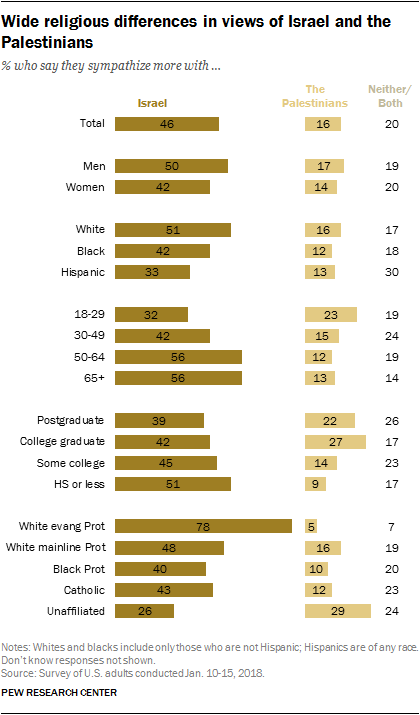Age, Not Political Party, Is Key To Understanding American Views On Israel

Graphic by Angelie Zaslavsky
The partisan divide over Israel has never been clearer than when President Trump mentioned Jerusalem during his State of the Union speech on January 30. Republicans stood for yet another ovation while almost every Democrat stayed in his or her seat (except for Senators Charles Schumer and Joe Manchin and Representative Debbie Wasserman-Schultz).
The partisan divide should come as no surprise: for eight years, Netanyahu and the rest of the Israeli right continually attacked President Obama, the country’s most popular Democrat, and then quickly embraced President Trump. It would be surprising if Democrats had so quickly forgotten this insult. As Israel Policy Forum’s Michael Koplow explained in the Forward, “Democrats are not looking at the Israeli-Palestinian conflict and determining that they have framed the issue incorrectly in their minds, or deciding that the Palestinian cause is more just and worthy of greater support. They are looking at Israel, and deciding that they like it less.”
Indeed, last week’s Pew Research Center study on American views of the Israel-Palestine conflict provided a slew of data on partisan divides. 79 percent of Republicans sympathize with Israel over the Palestinians, according to the Pew data, compared to only 27 percent of Democrats.
Among Democrats, the decline over the last few years in those who say they sympathize more with Israel than the Palestinians is seen both among liberals and among conservatives and moderates. https://t.co/k2XOjB8Sru pic.twitter.com/NbDm4xMrjT
— Pew Research Center (@pewresearch) January 29, 2018
But buried in the study is a more important gem: People under 30 are almost twice as likely to sympathize with the Palestinians over Israel than people over 50 are.
A minority of individuals aged 18-24 sympathize with the Israelis more than the Palestinians (32 percent), and nearly a quarter sympathize with the Palestinian cause more than the Israeli one (23 percent). An additional 19 percent of young people throw their support behind both or neither side. In comparison, a majority of Americans over fifty side with Israel (56 percent), and those aged 30-49 support Israel over the Palestinians by a 27 percent margin.
This data will likely embolden the Palestinian solidarity movement — and terrify the wits out of mainstream Jewish conservatives, if they’re paying attention.
Thankfully, there is also a glimmer of hope for those on both sides interested in a peaceful solution to the conflict: When asked “Can a way be found for Israel and an independent Palestinian state to coexist peacefully, or not?,” a majority of Americans between 50 and 64 believe the a two-state solution is not possible. Young people, by contrast, are filled with hope. A full 60 percent believe in the potential of a two-state solution, whereas less than half of that — 28 percent — disagree.
These statistics should relieve any true supporter of Israel or Palestine — anyone who believes in a just and humane solution to the conflict. Youth views on Israel are the inevitable outcome of obvious injustice that has been carried out in Israel and Palestine for the past five decades. Young people, and young Jews, are changing the conversation around Israel and the occupation. On Monday, the head of the Jewish Agency told a conference that “I think it’s very important that we move to a new mode and encourage young Jews not only to engage in Israel advocacy and in defending Israel — those are all important things — but also to have them accept the legitimacy of challenging Israel.”
The time for monolithic communal positions on the Jewish State is passed. This Pew survey hails a new era in which Jews and non-Jews alike can hold diverse and intelligent conversations on Israel and Palestine and, hopefully, work steadily towards a long-overdue solution to the conflict.























